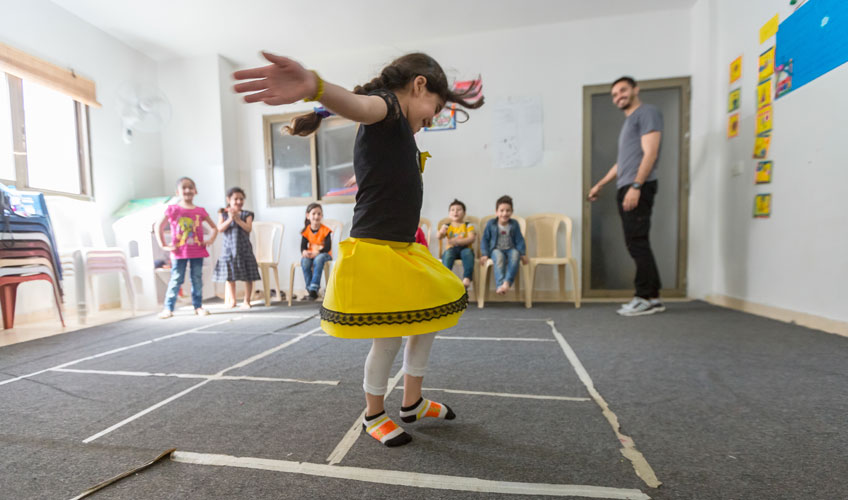How bridging mental healthcare and humanitarian aid can help build peace
Integrating mental healthcare and psychosocial support into humanitarian efforts contributes to societies’ ability to recover from conflict, rebuild peaceful societies, and prevent future conflict.

The Dutch foreign trade and development co-operation minister, Sigrid Kaag, wrote in The Guardian:
“Mental health and psychosocial support should be available to all people in conflict and post-conflict situations. Neglecting people’s mental suffering — staying silent — is not an option. If we truly want to help a country with reconstruction, we shouldn’t just rebuild the bombed bridges. We should also help people repair their broken souls.”
As an organisation with over 30 years’ experience building peace after brutal conflicts, we welcome the minister’s focus on integrating MHPSS into humanitarian efforts as a way of investing in societies’ ability to recover from conflict, rebuild peaceful societies, and prevent future conflict.
A recent World Health Organisation (WHO) study revealed the effect of violent conflict on people’s mental health is even higher than previously thought. Researchers found that one in five people in post-conflict settings has depression, anxiety disorder, post-traumatic stress disorder (PTSD), bipolar disorder or schizophrenia.
This makes it extremely challenging to rebuild societies affected by conflict – even after the fighting stops. Time and again we see not only the impact of trauma on the individual, but also on the very fabric of society, in the way people relate to each other, how they solve problems and bring up their children.
Tackling trauma is therefore fundamental to building long-term peace.
The good news is there is a growing recognition that humanitarian responses should include mental health and psychosocial services (MHPSS). Still, mental healthcare often remains a secondary consideration, while the role of trauma in social cohesion and peacebuilding is even more overlooked. This is particularly the case in crisis settings, where the often-overwhelming immediate need for emergency response eclipses everything else.
The good news is there is a growing recognition that humanitarian responses should include mental health and psychosocial services.
One way to address this is for organisations already working on mental healthcare in crisis to share more proven, evidence-based approaches for integrating MHPSS into humanitarian programmes.

For example, at International Alert, we have been working with our partners in Lebanon, Syria and Turkey to deliver peace education – an approach that involves training educators to promote peaceful interaction between children and young people through building respect for diversity, creating safe spaces and providing specialist support for children to deal with trauma, and restoring social support networks.
Evidence suggests that this approach has been successful in supporting children and young people to resolve tensions through dialogue and listening to others, and to manage and express anger in non-violent ways, thus helping them heal and regain a positive self-identity. This in turn helps lay the foundations for building social cohesion, benefiting individuals and communities alike.
In Ukraine, our research shows that internally displaced people (IDPs and veterans of the ongoing armed conflict in the east are particularly vulnerable to mental health problems, and struggle to access effective care. Almost three quarters of IDPs we spoke to who required mental healthcare did not receive it. In response, we established three ‘model’ centres in three key cities as well as six mobile clinics in the hardest-hit areas, providing a range of psycho-social support for people affected by conflict. Over 18 months, between 2017 and 2018, these centres were able to reach over 24,000 people, including 16,000 IDPs.
By combining the provision of psychological support with other social services under the same roof, the centres were more easily accessible for those who were reluctant to seek out mental healthcare due to social stigmas – a particular issue for male veterans. When we spoke recently to a number of former combatants, mental health issues were the most discussed topic when they told us about the challenges they faced reintegrating into society.
For children, who have been especially traumatised by the conflict, we organised a series of ‘peace education’ summer camps, where they stay for two weeks in the forest, play and receive psychosocial support. Such programmes can’t undo horrific experiences, but they can help children cope better and build resilience.
As Iryna, a camp volunteer, told us:
We see the difference in their eyes. At the start, they don’t look at you, but by the end of the two weeks, they will look you in your eyes, they are breathing normally again and you can see the tension going away.
We continue to call for a scaled-up, comprehensive and trauma-informed approach to the provision of mental healthcare for conflict-affected populations in Ukraine.

The case of Rwanda, where the wounds of trauma run deep even decades after the genocide, also shows that such healing work must continue even after the violence ends. There, we found that counselling and personal healing are crucial to helping communities recover and in supporting the broader reconciliation process. It can go hand-in-hand with more tangible forms of assistance such as that intended to improve economic status. People had increased self-awareness, more confidence in and understanding of themselves, and were better able to manage their emotions and behaviour. Subsequently, they could better understand, trust and potentially forgive the ‘other’, as well as to cooperate and engage in community life.
Building peace takes time and patience and a willingness to chip away at the often hidden, psychological, impacts of conflict as well as the physical ones. These examples demonstrate that this can be done, even in the most difficult circumstances.
More coordinated assistance in conflict and post-conflict situations is needed. We need to consistently be integrating MHPSS services into education, into livelihoods programmes, into emergency shelter and healthcare assistance.
We will continue to work with partners across the education, health and humanitarian sectors to make this a reality.
Key resources
Peace education in Syria/Lebanon/Turkey
Teaching peace, building resilience (2016)
Ukraine
What’s next for veterans in Ukraine? (2019)
Hidden burdens of conflict (2016)
Rwanda






